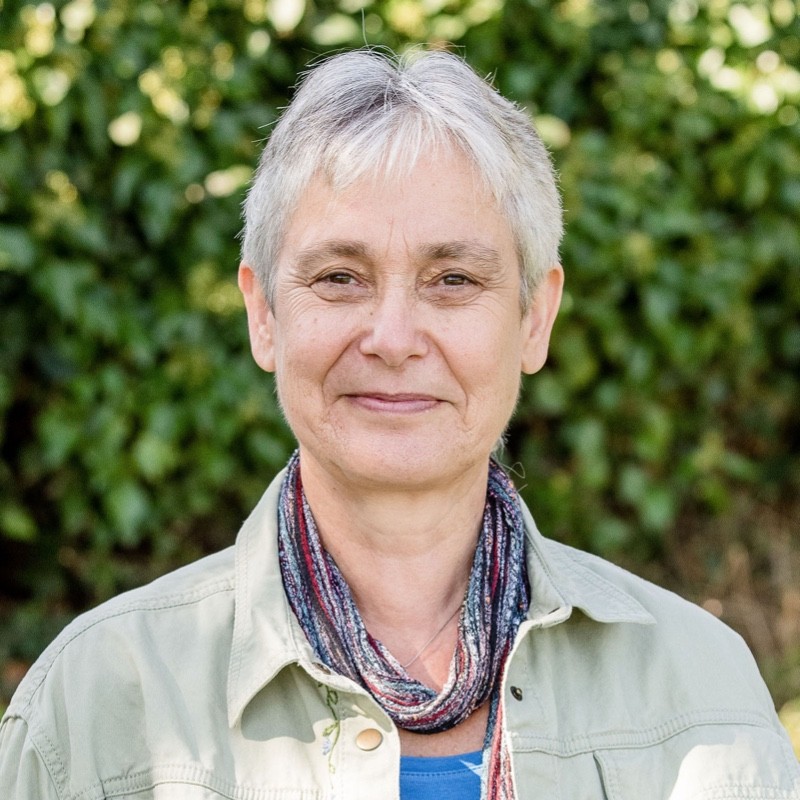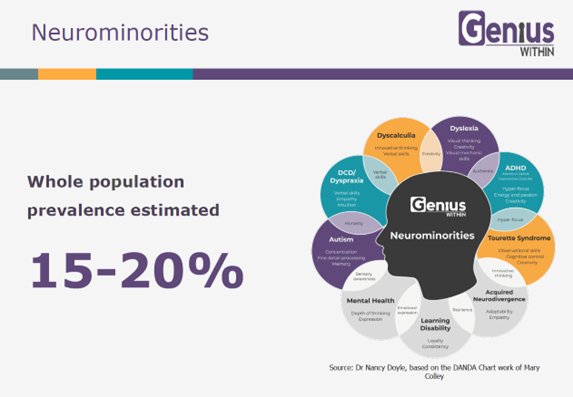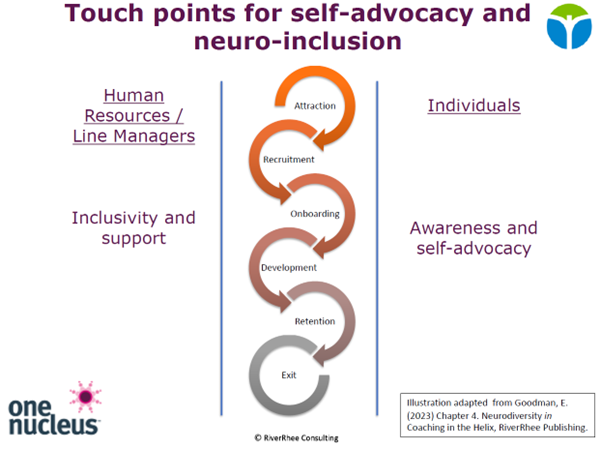Blog written by Elisabeth Goodman of RiverRhee Consulting...
Introduction by Monalisa Breazu, Learning & Development Administrator, One Nucleus:
Following on from our Building Life Science Adventures (BLSA) conference series, we are delighted to be able to continue those conversations with a new BLSA Special Interest Group (BLSA SIG). What this means is that this will now be a series of shorter seminars/workshops to deliver valuable advice and fill knowledge gaps on key topics to best support our members in retaining and developing teams.
We’re thrilled to share that our first neurodiversity webinar was a great success! The session brought together a wonderfully mixed audience, including HR professionals, managers, and scientists, all eager to learn and grow. It was incredibly inspiring to see such a high level of engagement from everyone who attended.
What stood out the most was the enthusiasm of the participants. All attendees were genuinely interested in expanding their knowledge about neurodiversity and learning how to self-advocate and create more inclusive environments in their workplaces. It wasn't just about professional development; many were also keen to gain deeper insights into themselves.
The variety of perspectives and experiences that our audience brought to the table made for rich, dynamic discussions. It was heartening to see so many individuals committed to making positive changes and supporting neurodiversity in their own spheres of influence.
With that in mind, you can watch the webinar recording on our YouTube channel here while reading about Elisabeth’s takeaways from this session below.
Elisabeth Goodman, Coach (PCC) and author, RiverRhee Consulting I am, as I think the delegates will have witnessed, passionate about helping people to find ways to thrive in their working environment. We hear a lot about the need to optimise productivity but, for neurominorities, this can come at a cost to their general wellbeing. To thrive at work, we need to understand and speak up for what we need. This is self-advocacy. And we need a working environment that is proactive in meeting those needs. This is neuro-inclusion.
I am, as I think the delegates will have witnessed, passionate about helping people to find ways to thrive in their working environment. We hear a lot about the need to optimise productivity but, for neurominorities, this can come at a cost to their general wellbeing. To thrive at work, we need to understand and speak up for what we need. This is self-advocacy. And we need a working environment that is proactive in meeting those needs. This is neuro-inclusion.
I had asked participants to complete a pre-seminar questionnaire to indicate their level of understanding of neurodiversity, their lived experience, what neurominorities (such as autism, ADHD, dyslexia and dyspraxia) they would like to hear about, and any particular questions they had.
It was evident, as Monalisa indicated, that there was a high level of interest in the topic, and also a good level of awareness already about it. This set the scene for a rich dialogue that continued throughout the seminar.
The topics that seemed to particularly resonate with people included:
- We still, even with a baseline awareness, have so much more to learn about the various forms of neurodivergence and how they show up for each individual. I quoted liberally from Genius Within’s website. I do a lot of my coaching as an Associate with them.

- We can get stuck with stereotypes and forget how each individual will show up differently, with their strengths as well as their challenges. We can get fixed on the challenges, which are important, and lose track of the strengths, which can be many and significant. The extremes between these will be more pronounced for people who are neurodivergent, as shown in the Spiky Profile below.

- Someone who is newly diagnosed will still be learning about themselves and what they need. They may have had years of ‘masking’: striving to fit in with how they are expected to be, and so it will take time to reacquaint themselves with who they really are. Organisations can help by having a menu of the kinds of adaptations that an individual could choose from.
- Adaptations, which are likely to benefit anyone, whether they identify as being neurodivergent or not, include flexible working locations, environments and hours; adaptations to technology and workstations; a review of expected roles and responsibilities; and additional support, for instance, coaching.
- People who are neurodivergent will often experience challenges around executive functions and skills such as organisation, time management, concentration and focus, memory, emotional regulation, communication, effort and energy. Stress management can also be a challenge. A coach can help individuals develop strategies and resources around all of these, as well as gain a better awareness of their strengths and how to self-advocate.
- The cost of masking and of trying to fit in with an environment and expectations that are not always neuroinclusive can be mental health issues such as anxiety and depression. These will put an additional strain on executive function and stress management. Many neurodivergent people that I work with also benefit from counselling to support them. Medication can also make a huge difference.
- HR, Occupational Health, leaders, and managers will all benefit from neurodiversity awareness training, so that they can better understand the legislation, the terminology, the range of strengths and challenges people might experience, how they can initiate conversations, and provide support in the form of reasonable adjustments.
- We agreed that conversation between managers and direct reports and within teams, will be the most effective way to enable self-advocacy and neuro-inclusion. It needs to be open, two-way, and fully participative, with minimal assumptions involved. Good conversation starters could include: “(Manager) What could I do to better support you in your work?” “(Individual) What would really help me in my work would be …”. Managers could also have team events where everyone is invited to share what they perceive as their strengths and what they need from others and from themselves to support them in their work.
- People do not need to have a diagnosis, and they do not need to divulge it, to get the support that they need. There is still a lot of stigma out there, so labels can be challenging to work with. It’s an individual choice. However, if an individual is willing and able to disclose, it could pave the way for a richer dialogue across the whole organisation.
- Organisations can set up Neurodiversity Employee Networks, and individuals who are Neurodiversity Champions. They can advertise their neuro-inclusivity on their web site and proactively provide support at the recruitment stage and throughout the employee life-cycle. Individuals can ask to see interview questions in advance and have a buddy with them during the interview process. They can also ask for a workplace assessment and further support (such as coaching) through the Access to Work scheme.

I would be delighted to continue the conversation about this very important topic. Do please follow me on LinkedIn, take a look at my website, or get in touch with me directly if you would like to find out more.